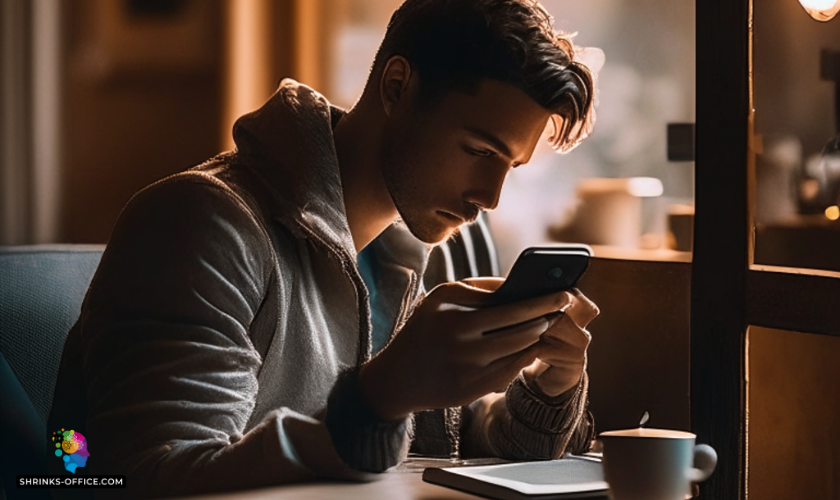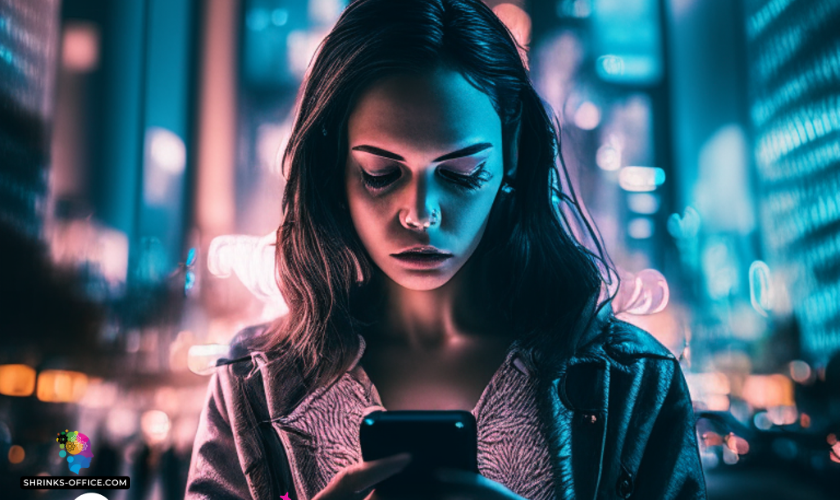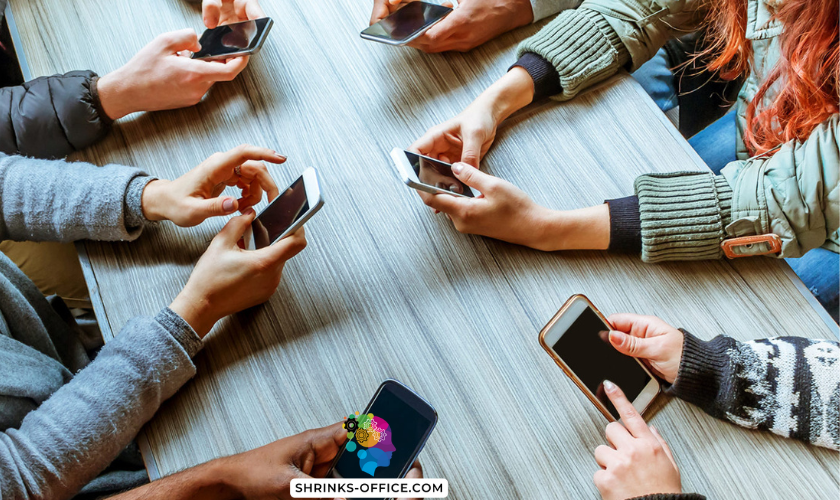In today's fast-paced world, finding moments of mindfulness can be a challenge. Embracing "The Power of Now"...

- Acknowledge the problem
- Set specific goals
- Track your usage
- Turn off non-essential notifications for social media apps
- Set specific times during the day when you can check your social media
- Reduce the number of people, pages, or groups you follow to limit the amount of content you're exposed to
- Replace social media time with more meaningful activities
- Implement a digital detox
- Share your goals with friends or family and ask for their support
- Stay focused on your goals, and remember that progress might be slow but is still worthwhile
For more, read Social Media Addiction: Recognizing the Signs and How to Overcome It.
Addiction to social media usage has been on the rise in recent times. Social media addiction can potentially harm one's emotional well-being, physical health, interpersonal relationship connections, and even mental health. If you have this issue, learning practical techniques to break social media addiction is crucial.
We'll discuss how to withdraw from social media platforms successfully and your options. We will also compare and contrast the withdrawal symptoms of social media and other addictions. Finally, we'll reveal what you can gain by reducing your time on social media.
If your looking for a more general overview of social media addiction, we recommend our other blog on social media addiction, where we discuss its negative impacts on mental and physical health.
Did you know?
Excessive social media use can trigger anxiety, making it a double-edged sword in our digital age.

In 2018, the average time spent daily on social media by persons with access to the internet worldwide was 144 minutes. However, studies show that an average of 30 minutes of social media use per day, is best for mental wellness. [1]
While abstinence is commonly advocated to treat substance abuse, moderated internet use is the most psychologically beneficial consequence when dealing with social media addiction. Although complete abstinence from social media isn't required, it is helpful to have methods in place for establishing reasonable restrictions on usage.
If you don't want to quit social media but want to break free from the so-called social media addiction, the following tips below will help you shape your life when using social media apps.

To mitigate the negative impacts of social media on your health, life, and relationships, it is crucial to limit your use. How can you achieve this? Here are some specific steps to guide you:
To start, establish specific times or days of the week for social media use. For instance, you might decide to only use social media during lunch breaks or after work hours. This also involves setting a daily limit—30 minutes or less can be an effective starting point. Remember, you don't have to delete apps entirely to gain control over your social media habits.
Use tools such as timers or apps that monitor your social media usage. These can be set to block access to these sites after a specific amount of time has passed, helping you stick to your predetermined limits.
Here are more strategies to help you manage your social media use effectively:

Researchers in 2019 found that some students who disconnected from social media for five days reported feeling a "sense of serenity" and a sense of self-worth. While others were worried they would be left behind. [2] Participating in a social media cleanse or a digital detox is an effective way to break your social media addiction. Here's how you can embark on this journey:
Helpful tip: Follow online therapist influencers for helpful insights on managing social media addiction. Their tips can be a game-changer for your mental health

Dissatisfaction with one's appearance and depression are major causes of social media addiction. The allure of comparing oneself to others through their social media posts is compelling, and it's easy to get drawn in. [3] However, remember that the content on social media platforms does not necessarily indicate reality. People generally only share the highlights of their lives and frequently create or filter their images to make them look better.
Don't judge your happiness based on the social media updates of others. It will lead to mental health effects, which can also have negative effects on your overall lifestyle. If a friend posts pictures from their recent vacation on Facebook or Instagram, resist the urge to evaluate your own life against theirs. It's likely they only shared the best parts of their trip with their family members online, and you have yet to learn how they live their daily life.
Helpful tip
Don't compare your life to others' online highlights. Embrace the benefits of online therapy for a healthier perspective and better self-esteem!

The key to breaking your social media addiction lies in determining the motivation behind your actions. What are the triggers that lead you to check your social media feeds? This is a multifaceted process, and the following specific steps can guide you:

To help you break your social media addiction, you can do something else you find interesting instead of going onto social media. There are many other ways to pass the time, like reading, going to the gym, cycling, spending quality time with family, etc. If you're feeling isolated, pick up your phone and talk to a real person which is much better than online relationships.
You may also cut back or eliminate your use of social media if you use your time to focus and do something productive, like writing or painting.
Taking a break from social media may help you regain control if you're finding it difficult to limit your usage healthily. This can be done by temporarily suspending your account or removing the apps from your mobile phone or device.
Taking a break from social media can be difficult, but it's worth it. This action will allow you to refocus your energy elsewhere. There's no shame in admitting you are addicted to social media. Take note of how much time you spend on it, and try to set limits.

Since the introduction of social media platforms like Facebook, users' habits have considerably changed. Facebook started as a simple way for people to share photos and updates with their friends and family on a virtual "wall." [4]
Nevertheless, as time went on and other visually focused platforms emerged, such as Instagram, we stepped things up a notch with so many negative consequences. This was the beginning of the slippery slope, and it's still with us now.
Look at some of the most followed Instagram accounts right now. Manicured images and flawless layouts are the norms, and millions of users follow them. This has been popularized as an "Instagram objective," furthering the misconception that contented users are those whose feeds are filled with aesthetically pleasing photos. We all know this isn't true, yet the pressure to present an idealized version of one's life online contributes to rising cases of anxiety, sadness, and low self-esteem. [5]
You can also lose touch with your sense of reality because problems in the "real world" don't lend themselves to picturesque social media posts and status updates. The "perfect" environment you've cultivated online forces you to leave the physical world behind. This habit of avoiding reality by spending time on social media apps and platforms is called addiction.
If you notice your social media addiction has become extreme, you can manage the situation with Online Therapy.
If you're not sure whether you're addicted to social media or not, you can take this quick addiction test.
Like other addictions, social media addiction can be managed in various ways. You can break your social media addiction through self-awareness, establishing limits, taking breaks, and spending your free time on other satisfying or productive activities. All the tips we've listed are backed by extensive research and social experiments. [6]
Various factors can cause social media addiction. Stress, low self-esteem, and social anxiety can lead to excessive social media usage.
Breaking social media addiction is a gradual process, and the recovery time depends on the individual and other factors. It is crucial to stick to your schedule, even if it's as simple as "no social media after a certain time e.g. 8 pm. The minimum time to break a habit is at least three to four weeks.
2. Students on a Social Media ‘Detox’: Disrupting the Everyday Practices of Social Media Use
In today's fast-paced world, finding moments of mindfulness can be a challenge. Embracing "The Power of Now"...
In our fast-paced world, finding moments of tranquility can be a challenge. Meditation apps offer a convenient...
In our fast-paced world, taking time for self-reflection and mindfulness is essential for well-being. Journaling can be...
In today’s fast-paced world, managing stress has become an essential aspect of maintaining overall well-being. Two popular...
Dissociation can be a challenging experience, especially the one that happens at work. Are you experiencing dissociation?...
Bionic reading transforms the reading experience for ADHD individuals by guiding the eyes for focus and understanding. Dive into the world of bionic reading.
Explore the complexities of postpartum depression and genetics in our blog 'Is Postpartum Depression Hereditary?' for insights into maternal mental health.
